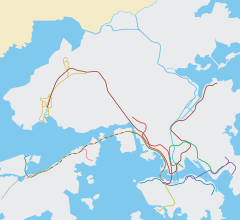Lei Tung station
Lei Tung 利東 | |||||||||||||||||||||||||||||||||||||||||||||||||||||||||||||||
|---|---|---|---|---|---|---|---|---|---|---|---|---|---|---|---|---|---|---|---|---|---|---|---|---|---|---|---|---|---|---|---|---|---|---|---|---|---|---|---|---|---|---|---|---|---|---|---|---|---|---|---|---|---|---|---|---|---|---|---|---|---|---|---|
 Lei Tung station Exit B | |||||||||||||||||||||||||||||||||||||||||||||||||||||||||||||||
| Chinese name | |||||||||||||||||||||||||||||||||||||||||||||||||||||||||||||||
| Traditional Chinese | 利東 | ||||||||||||||||||||||||||||||||||||||||||||||||||||||||||||||
| Cantonese Yale | Leihdūng | ||||||||||||||||||||||||||||||||||||||||||||||||||||||||||||||
| |||||||||||||||||||||||||||||||||||||||||||||||||||||||||||||||
| General information | |||||||||||||||||||||||||||||||||||||||||||||||||||||||||||||||
| Location | Lei Tung Estate Road, Ap Lei Chau Southern District, Hong Kong | ||||||||||||||||||||||||||||||||||||||||||||||||||||||||||||||
| Coordinates | 22°14′32″N 114°09′22″E / 22.2421°N 114.1562°E | ||||||||||||||||||||||||||||||||||||||||||||||||||||||||||||||
| Owned by | MTR Corporation | ||||||||||||||||||||||||||||||||||||||||||||||||||||||||||||||
| Operated by | MTR Corporation | ||||||||||||||||||||||||||||||||||||||||||||||||||||||||||||||
| Line(s) | South Island line | ||||||||||||||||||||||||||||||||||||||||||||||||||||||||||||||
| Platforms | 2 (1 island platform) | ||||||||||||||||||||||||||||||||||||||||||||||||||||||||||||||
| Tracks | 2 | ||||||||||||||||||||||||||||||||||||||||||||||||||||||||||||||
| Construction | |||||||||||||||||||||||||||||||||||||||||||||||||||||||||||||||
| Structure type | Underground | ||||||||||||||||||||||||||||||||||||||||||||||||||||||||||||||
| Platform levels | 1 | ||||||||||||||||||||||||||||||||||||||||||||||||||||||||||||||
| Accessible | Yes | ||||||||||||||||||||||||||||||||||||||||||||||||||||||||||||||
| Other information | |||||||||||||||||||||||||||||||||||||||||||||||||||||||||||||||
| Station code | LET | ||||||||||||||||||||||||||||||||||||||||||||||||||||||||||||||
| History | |||||||||||||||||||||||||||||||||||||||||||||||||||||||||||||||
| Opened | 28 December 2016[1] | ||||||||||||||||||||||||||||||||||||||||||||||||||||||||||||||
| Services | |||||||||||||||||||||||||||||||||||||||||||||||||||||||||||||||
| |||||||||||||||||||||||||||||||||||||||||||||||||||||||||||||||
| |||||||||||||||||||||||||||||||||||||||||||||||||||||||||||||||
| |||||||||||||||||||||||||||||||||||||||||||||||||||||||||||||||
Lei Tung (Chinese: 利東; Cantonese Yale: Leihdūng) is an underground MTR rapid transit station in Hong Kong on the eastern section of the South Island line, located beside Mount Johnston on Ap Lei Chau in Southern District. The station is named after the adjacent public housing estate of the same name, which it serves in addition to Ap Lei Chau Main Street. The station is located below Yue On Court and Lei Tung Estate. It is the southernmost railway station in Hong Kong.
History
[edit]The station was built by the Leighton Contractors–John Holland Joint Venture under a contract numbered 904, awarded May 2011, which also included South Horizons station and sections of running tunnel.[2] It was constructed using the drill-and-blast method.[3]
Lei Tung station was opened on 28 December 2016, with the rest of the South Island line.[1]
Station layout
[edit]| G | Street level | Exits |
| L7 | Concourse | Customer service, MTRShops, vending machines, ATMs |
| Octopus Add Value Machine | ||
| L8 Platforms |
Platform 2 | South Island line towards Admiralty (Wong Chuk Hang) → |
| Island platform, doors will open on the right | ||
| Platform 1 | ← South Island line towards South Horizons (Terminus) | |
The station is underground with two tracks and an island platform.[4] North of the station, the line rises onto Aberdeen Channel Bridge, a railway bridge designed by Atkins Global that spans the Aberdeen Channel.[5]
Artworks in the station are Dawn of a New Day and Journeys Along the South Island Line (East) by local children under the respective leadership of Castally Leung Ching-man and Sum Sum Tse. The art is located in the passageway to exit A, as well as the concourse and lift cars of exit B.[4][6]
Entrances/exits
[edit]Lei Tung station has three exits. The exit to Lei Tung Estate Bus Terminal is connected to the concourse by lifts instead of escalators, due to the 40 m (130 ft) depth of the platforms. Passage from exit A to exit B does not require entering the paid area.[4]
- A1: Ap Lei Chau Main Street (ground level)
 [4]
[4] - A2: Ap Lei Chau Bridge Road (accessed by lift)
 [4]
[4] - B: Lei Tung Estate, Lei Tung Commercial Centre, taxi stand, bus terminal (all entry/exit by 4 lifts)
 [4]
[4]
References
[edit]- ^ a b "MTR's South Island Line to open on December 28". RTHK. 5 December 2016.
- ^ "Progress Update". South Island Line. MTR Corporation. Archived from the original on 16 January 2017. Retrieved 14 January 2017.
- ^ "South Island Line (East) Rail Project Contract 904". Leighton Asia. Retrieved 14 January 2017.
- ^ a b c d e f "MTR – South Island Line> Station Information > Lei Tung Station". mtr-southislandline.hk. Retrieved 1 November 2016.
- ^ "Design of Aberdeen Channel Bridge, Hong Kong" (PDF). atkinsglobal.com. Atkins Global. 2011. Retrieved 1 November 2016.
- ^ 港鐵車站藝術計劃及進展 / Approach and Updates of MTR Art Programme (PDF). Government of Hong Kong. January 2013. pp. 45–46. Retrieved 1 November 2016.


